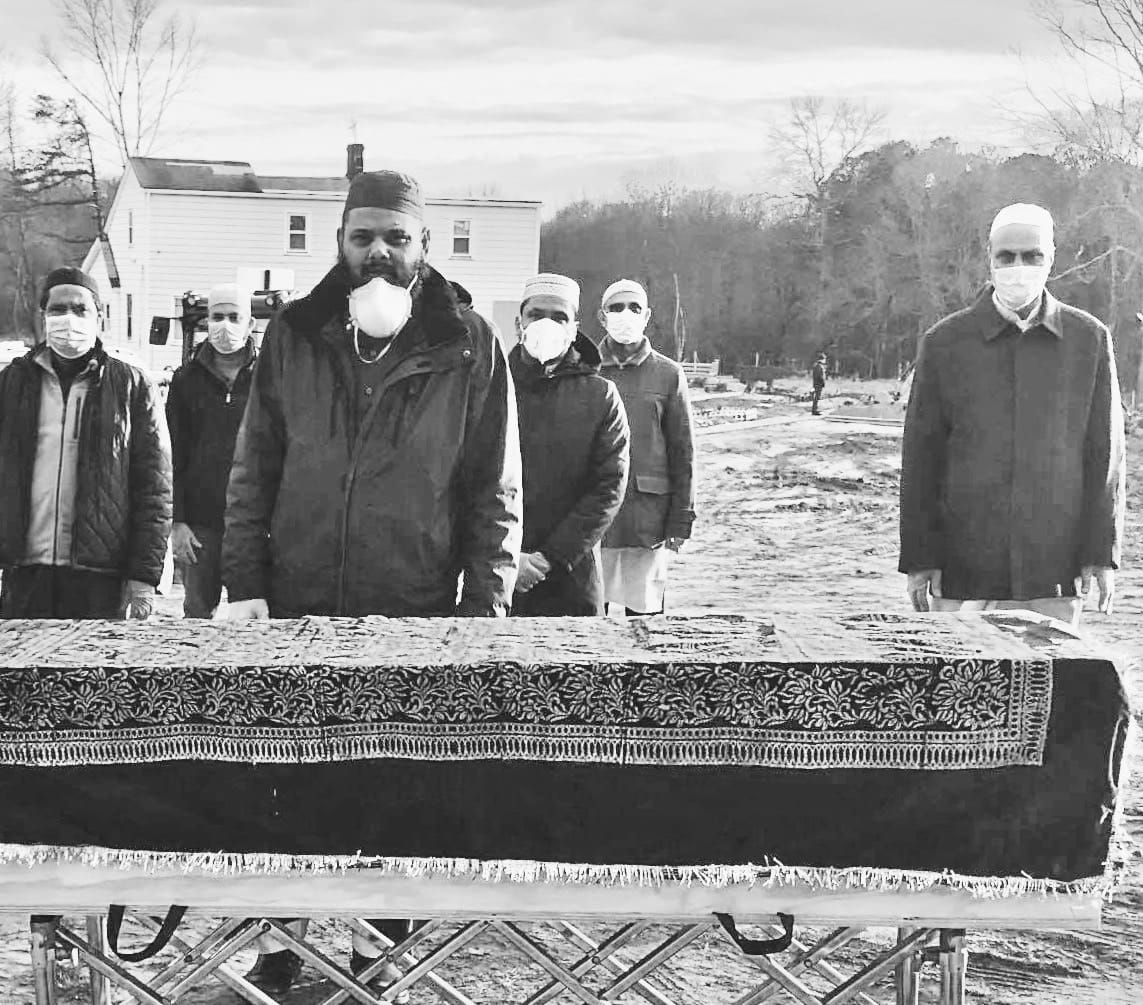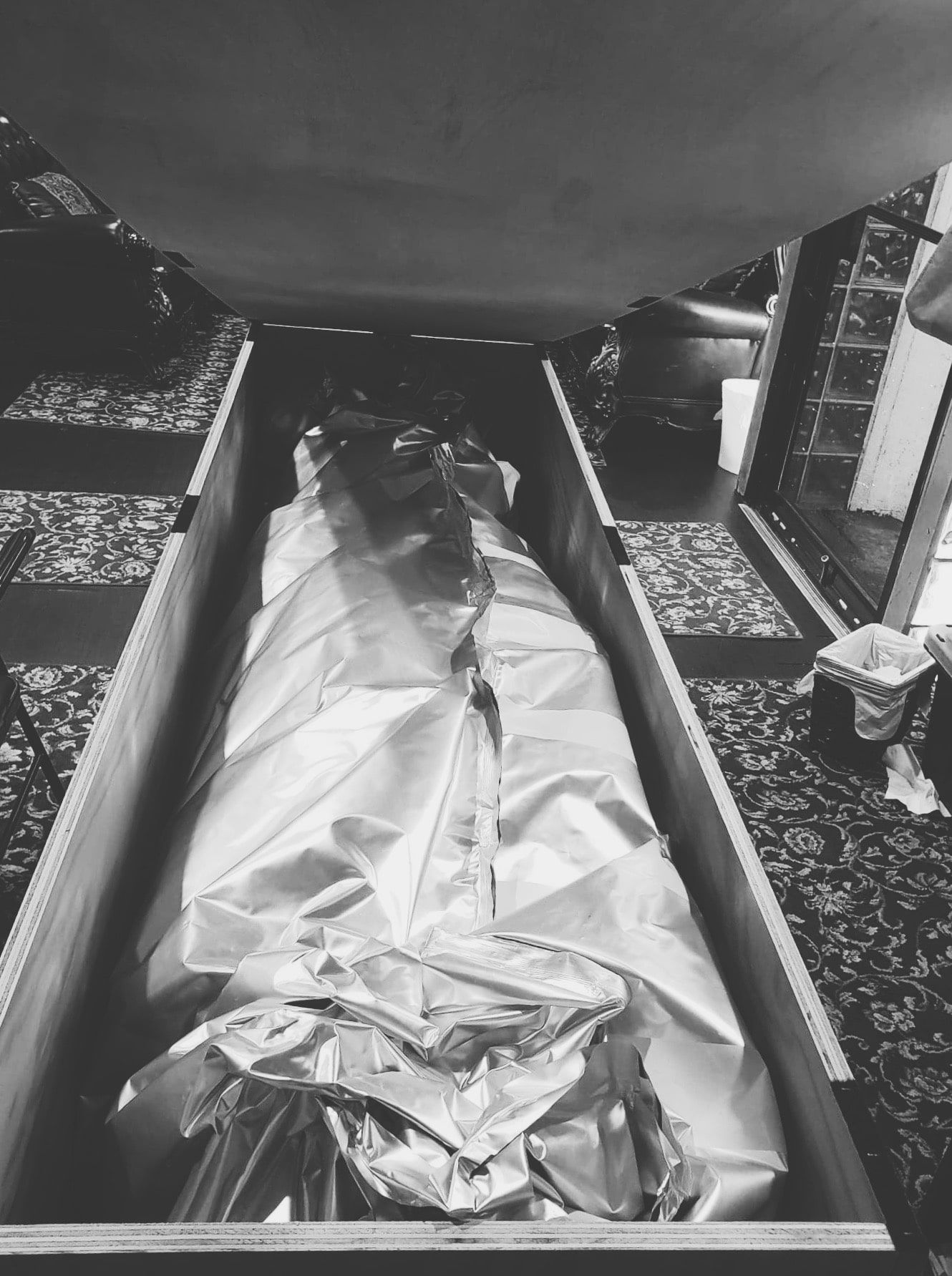Muslims And Jews Struggle To Observe Burial Traditions As Loved Ones Die In The Pandemic


BROOKLYN – Mohammad Qadeer, 55, loved to make everyone laugh. He loved being surrounded by the ones he adored the most. Last week, he tested positive for the coronavirus. A few days later, he died. What hurts the most is that he died all alone, his daughter tells us.
When a Muslim or Jew dies, their body is taken to a funeral home where it is washed in a particular way, in accordance with the religion, and then shrouded before the funeral which has to happen within hours of death. In Islam, it’s called the janazah, where there is a prayer service and the body is buried. In Judaism, a eulogy is delivered, prayers are read, and the body is buried.
But fulfilling these sacred traditions is complicated during the coronavirus pandemic.
“I only wanted one last hug,” Qadeer’s daughter, Arfa Qadeer, 20, told Bklyner. “He was honestly an amazing man… He used to make everyone laugh. He was loving, deen daar (man of faith). He sacrificed so much for us to be raised here. He lit up the room. If he was in the room, people were drawn to him. He was a people’s person. And he died alone.”
Qadeer, a taxi driver, would happily count down the days until Arfa’s wedding. When he was in the hospital, he would ask his wife why she wouldn’t come to see him. “Why aren’t you coming to visit? Do you not love me?” his daughter recalled. His wife couldn’t visit him because hospitals have banned visits from family and friends to reduce the risk of spreading the coronavirus. And so when he died, his wife broke down. She told Arfa, her husband’s last wish was for her to go see him and she couldn’t even do that.
“People take COVID-19 as a joke,” she said. “It hurts so, so much that people don’t realize how bad this is.”
On an ordinary day, Umair Ahmed, a chaplain and the funeral coordinator at the Muslim Funeral Services of NY would perform about three to five funerals. This week, due to the pandemic, they have been performing double that amount, anywhere from six to ten funerals every day, and the number is expected to rise.
As of 4:30 p.m. yesterday, 1,374 people in NYC have died because of COVID-19. In Brooklyn, the number has gone up to 328 people. There has been so much death in hospitals, that morgues are overflowing and the bodies are sealed up and placed in refrigerated trucks.
The City has given general guidelines to the funeral directors, but Imam Ahmed Ali from IQRA Masjid Community and Tradition says the City should be specific and guide funeral homes with the dos and don’ts on handling the bodies of people deceased as a result of the coronavirus.
“The message isn’t clear. Should every funeral home open the zipped bag, remove drip lines, etc, like in the past and continue the same procedure?” he asked. “If not, then the City should make sure that before hospitals zip the body, they remove all drip lines, etc, and make sure that no blood is coming out from the deceased’s body.”
In Judaism, the ritual of washing the body is referred to as tahara. In Islam, the ritual is referred to as a ghusl. Men would wash men, women would wash women. Then comes the shrouding – the body would be wrapped in white cloth. Neither a Jew nor a Muslim is to be buried in their usual clothing.
In the coronavirus age, this has changed.
Suzin Weinstein Rubin is one of the funeral directors at Weinstein, Garlick, Kirschenbaum Chapels on Coney Island Avenue. She told Bklyner that if it is not a coronavirus case, only one person is coming in to do the washing and shrouding. But if it is a coronavirus case, there is no washing and the shroud is being placed over the person, not on the person. She noted that all of the funeral arrangements are being conducted over the phone to practice social distancing rules. At her funeral home, there is now only one funeral director in the building at a time.
“This is the wildest and craziest time I have ever seen. I am very sad and feel tremendous compassion for everyone,” she said. “I just had a call from a woman who’s friend died of the virus and they have little money. I am glad to work with the family in every way possible (which we are) and only am asking for the monies that we have to pay for the cemetery and death certificates. It is just very pathetic.”

Ahmed told Bklyner that water is no longer being used to wash the people who died from the coronavirus. Instead, they go to the next step, referred to as tayammum, which is a form of dry purification that is done by rubbing hands in sand or soil and then rubbing it over the whole head, face, neck, shoulders, arms, forearms, and hands, up to the fingertips, he explained. The shrouding remains the same.
Then comes the funeral.
Gatherings of any size have been banned and the State has mandated that people stand within six feet of one another. In both Judaism and Islam, cremation is forbidden. Bodies are to be buried, and it needs to be done as soon as possible (if it is possible to do so). Before the body is buried, a salatul janazah (funeral prayer) is performed by Muslims. Since all masjids are closed, Ahmed explained that the salataul janazah is now performed at the cemetery itself before burying the deceased. Some funeral prayers are also taking place on the empty streets, where people have masks on and stand six feet apart from one another.
Qadeer’s funeral took place in New Jersey. At the janazah, which was in the graveyard, only ten people were allowed. Arfa recalled that her father wanted to buried in Pakistan, but that wasn’t possible. At the funeral, everyone was required to wear a mask and gloves.
“He had such a sad janazah. We couldn’t see him. He was in a biohazard bag,” Arfa said. “We couldn’t even see our dad. People take so much for granted and my dad suffered all alone.”
According to Majlis Ash-Shura: Islamic Leadership Council of New York, all families should perform janazah services in coordination with their funeral homes.
“Mosques are recommended to not perform janazah services unless they have proper personal protective equipment (PPE). Extenuating circumstances according to Islamic law, allow families to perform delayed funerals in accordance with funeral homes who may contain PPE,” the statement said. “Furthermore, we urge that all janazah services are performed with as few people as possible, with only immediate family members, while maintaining social distancing protocols.”
Ahmed noted that to ensure the safety of the relatives, no more than nine people are allowed to attend the burial. And at the burial, they make sure everyone is practicing social distancing rules. Rubin told Bklyner the same thing. The burial services at the gravesite are being performed with no more than ten people attending. For both faiths, in which attending someone’s funeral means sending blessings to the deceased, not being able to do so is quite difficult. But Ahmed said it is more important to ensure the safety of those who are alive.
“This virus has definitely changed the way we live our lives and the things we took for granted, such as breathing air openly and going outside for a walk or going to pray at the local masjid. Whatever it may be, this virus has not only affected people globally but everyone individually,” he said. “Remember, you are going to die. We know that. We believe it. We just don’t know when.”
He ended with a duaa (a supplication) that Muslims recite when someone, anyone, dies. Inna lillahi wa inna ilayhi raji’un. “To Allah we belong and to Him we return.”




